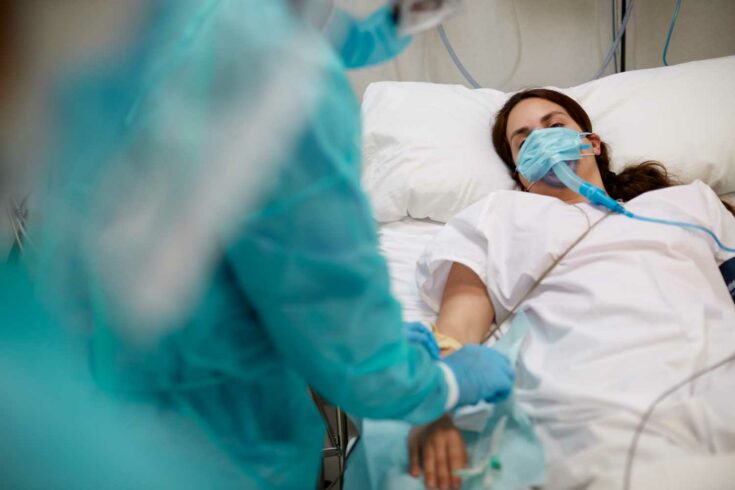A study of more than 70,000 people in 302 UK hospitals finds that 1 in 2 people hospitalised with COVID-19 developed at least 1 complication.
The ongoing study, called ISARIC4C, was funded by the Medical Research Council and the National Institute for Health Research.
The latest results, published in The Lancet, are the first to systematically assess a range of in-hospital complications, and their associations with age, sex and ethnicity, and their outcomes for the patients.
The authors say these complications are likely to have important short and long-term impacts for patients, healthcare utilisation, healthcare system preparedness, and society amidst the ongoing COVID-19 pandemic.
Complications high, even in young and healthy
The complications in patients admitted to hospital with COVID-19 were high, even in young, previously healthy individuals, with 27% of 19-29 year olds and 37% of 30-39 year olds experiencing a complication.
Acute complications were associated with reduced ability to self-care at discharge, with 13% of 19-29 year olds and 17% of 30-39 year olds unable to look after themselves once discharged from hospital.
Overall, complications occurred in 50% of all participants, including in 44% of participants who survived.
The most common complications were:
- renal (affecting 24%)
- respiratory (18%)
- systemic (16%).
However, cardiovascular complications were reported in around 1 in 8 participants (12%), and neurological (4%), and gastrointestinal or liver (1%) complications were also reported.
Complications rise with age
The incidence of complications rose with increasing age, occurring in:
- 39% of 19-49 year olds
- compared to 51% of people aged 50 and older.
Complications were more common in men compared with females, with males aged older than 60 years the most likely group to have at least 1 complication:
- women aged under 60 years 37% and men 49%
- women aged 60 years and over 48% and men 55%.
People of white, South Asian, and East Asian ethnicities had similar rates of complications, but rates were highest in Black people:
- 58% in Black patients
- 49% in white patients.
Following hospitalisation, 27% of patients were less able to look after themselves than before COVID-19, and this was more common with older age, being male, and in people who received critical care. Neurological complications were associated with the biggest impact on ability for self-care.
Large amounts of care required
Based on these rates, the authors say that policymakers and healthcare planners should anticipate that large amounts of health and social care resources will be required to support those who survive COVID-19. For example, provision of follow-up clinics for those who have sustained in-hospital complications such as acute kidney injury or respiratory tract infection.
Professor Calum Semple, Chief Investigator from the University of Liverpool, said:
This work contradicts current narratives that COVID-19 is only dangerous in people with existing comorbidities and older people. Dispelling and contributing to the scientific debate around such narratives has become increasingly important. Disease severity at admission is a predictor of complications even in younger adults, so prevention of complications requires a primary prevention strategy, meaning vaccination.
Professor Ewen Harrison, joint senior author from the University of Edinburgh, said:
Patients in hospital with COVID-19 frequently had complications of the disease, even those in younger age groups and without pre-existing health conditions. These complications could affect any organ, but particularly the kidney, heart and lungs. Those with complications had poorer health on discharge from hospital, and some will have long-term consequences. We now have a more detailed understanding of COVID-19 and the risks posed, even to younger otherwise healthy people.
He adds:
Our review highlights some insightful patterns and trends that can inform healthcare systems and policymaker responses to the impacts of COVID-19. Our results can also inform public health messaging on the risk COVID-19 poses to younger otherwise healthy people at a population level, particularly in terms of the importance of vaccination for this group.
The study looked at cases between 17 January and 4 August 2020 before vaccines were widely available, and new variants of the virus had not arisen. However, the authors note that their findings remain relevant to younger healthy adults, many of whom remain unvaccinated.
They also note that these complications are different to long COVID symptoms in patients with COVID-19 who were not hospitalised.

